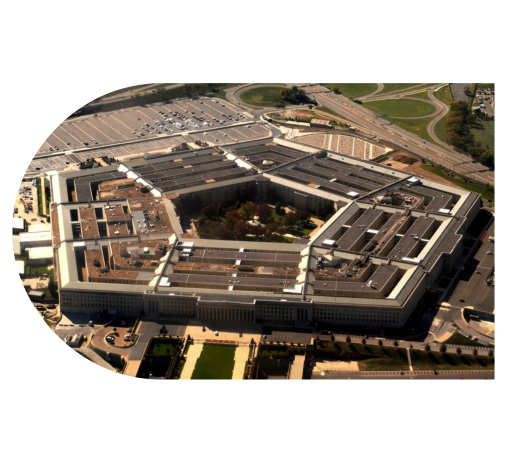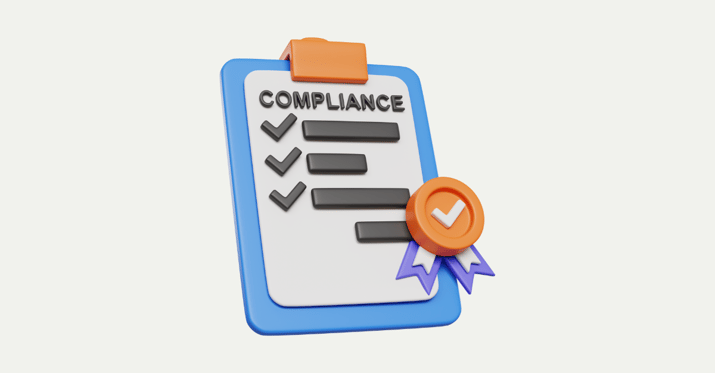
The Briefing Room: Growth Resources for Defense Contractors
Helping SMBs Succeed in the Defense Industrial Base
Schedule a Discovery CallWelcome to The Briefing Room! Whether you're just starting or looking to scale, we've organized key insights and resources to help you navigate the defense contracting space. Use the links below to jump to the topics that matter most to your business.

You’ve built something—a niche manufacturing shop, an IT security firm, or a sharp engineering consultancy. You’ve got the skills and ambition to work with the Department of Defense. But between the acronyms, shifting regulations, and contract complexity, breaking into the DIB can feel like navigating a minefield.
Every defense contract brings compliance demands—from CMMC and DFARS to FCL hurdles. A single misstep could cost you the bid, stall your growth, or trigger an audit you weren’t prepared for.
This page is your shortcut through the red tape. You’ll find practical guidance, vetted resources, and expert support to help you win contracts, stay compliant, and grow your business in the defense sector. Whether you're just getting started or scaling up, ISI delivers the IT solutions and compliance tools you need to succeed.
THE SMB ADVANTAGE:
Why SMBs Matter in the DIB
SMBs play an essential role in national defense; in fact, they make up 75% of the DIB. In fiscal year 2023, 28.4% of the DoD’s federal contract dollars—that’s $178.6 billion in total—went to small businesses, and $84.6 billion of that was awarded in prime contracts.
Your role extends beyond innovation. Small and mid-size contractors are crucial to a robust and secure defense supply chain. By collaborating with larger defense firms and directly with the DoD, SMBs ensure the timely delivery of critical components and services. This collaboration not only strengthens national security but also contributes to economic growth by supporting thousands of jobs across the country.
HOW TO GET STARTED AS A DEFENSE CONTRACTOR
1. DETERMINE YOUR ELIGIBILITY FOR AN FCL (FACILITY SECURITY CLEARANCE)
If you need to handle classified work, you’ll need the DCSA to grant you an FCL. You’ll need a sponsor (either a government agency or a prime contractor) to initiate the process.
Pro Tip: If you’re a small business, consider subcontracting with a prime contractor who already has an FCL to gain experience before pursuing your own clearance.
Check Out: How to Get a Security Clearance

2. REGISTER IN SAM.GOV & OBTAIN A CAGE CODE
Registering in the System for Award Management (SAM.gov) is mandatory for all businesses seeking government contracts. Once your SAM registration is complete, you’ll receive a Commercial and Government Entity (CAGE) code that uniquely identifies your business for contracting and security purposes.
Pro Tip: Ensure your company profile is complete and accurate, as incomplete registrations can cause delays in contracting opportunities.
Check Out: A Guide to Obtaining a Facility Security Clearance

3. Understand and Comply with 32 CFR “The Rule” (NISPOM)
Familiarize yourself with the National Industrial Security Program Operating Manual (NISPOM) and other applicable regulations. The NISPOM outlines the requirements for handling classified information and managing facility security.
Pro Tip: Joining an industry group such as NDIA or NCMS can provide networking opportunities and insights into best practices.
Check Out: Understanding NISPOM: A Comprehensive Guide

4. Set Up Security and Compliance Programs
Develop security policies, appoint an FSO (Facility Security Officer), and establish procedures for classified information handling.
Pro Tip: An Assistant Facility Security Officer (AFSO) from ISI can help you get the proper programs in place if you lack internal resources or expertise in security compliance.
Watch: Back to the Basics: How to Be an FSO with Blake Keyser, ISI’s Senior VP of MSS Operations

5. Ensure IT & Cybersecurity Compliance (CMMC)
The Cybersecurity Maturity Model Certification (CMMC) is a DoD requirement for contractors handling Controlled Unclassified Information (CUI), based on the cybersecurity standards outlined in NIST SP 800-171. Even companies that don’t work with classified data must follow these standards.
Pro Tip: C3PAO calendars are filling up quickly, so secure your spot well in advance. While the audit itself may take about a week, it can take 4–6 months just to get scheduled. Factor this lead time into your overall certification planning.
Check Out: The Role of the FSO in CMMC Compliance

6. Learn Federal Acquisition Regulations (FAR/DFARS)
The Federal Acquisition Regulation (FAR) and Defense Federal Acquisition Regulation Supplement (DFARS) establish the rules for government contracts. Focus on sections that impact small businesses and defense contractors (e.g., DFARS 252.204-7012 for cybersecurity). Not understanding these regulations can lead to compliance issues and lost contracts.
Pro Tip: The Defense Acquisition University (DAU) offers free courses on contracting regulations.

7. Establish Internal Controls & Financial Management Systems
Government contractors must comply with financial regulations and be prepared for audits from the Defense Contract Audit Agency (DCAA). Implement DCAA-compliant accounting practices (such as tracking direct vs. indirect costs separately and following Generally Accepted Accounting Principles (GAAP).
Pro Tip: Using government-approved accounting software such as Deltek Costpoint or QuickBooks with DCAA-compliant add-ons can simplify compliance.

CHOOSING THE RIGHT PARTNER: A CRITICAL DECISION FOR DEFENSE-FOCUSED SMBs
The right IT and compliance partner doesn't just keep the lights on. They help you navigate a complex security landscape, reduce risk, and position your business for sustainable growth in the defense industrial base (DIB).
If you're considering a new provider, ensure they:
- Have DIB-Specific Expertise
-
Defense contractors have unique cybersecurity and compliance needs, and your IT partner should know them inside and out. That means expertise in NIST SP 800-171, DFARS 252.204-7012, and the latest CMMC requirements—not just generic security policies that wouldn’t pass a DoD audit. Things to look for:
- Are they a Registered Provider Organization (RPO) with the Cyber AB?
- Have they achieved CMMC Level 2 Certification?
- Have they supported other defense contractors with compliance?
- Are Not Just Putting Out Fires—They’re Preventing Them
-
Reactive IT support is like waiting for your engine to explode before checking the oil. A good provider doesn’t just fix problems—they stop them before they happen. ISI’s managed compliance services keep your systems secure, monitored, and audit-ready, so you’re never caught scrambling before a contract renewal.
- Understand the Cost of Downtime
-
In the defense sector, a day of downtime can mean a lost contract, a security breach, or a compliance failure. Your IT provider should have strict response time guarantees, 24/7 support, and a proactive approach to keeping your systems running—because "We’ll get to it Monday" doesn’t work when you’re responsible for safeguarding CUI.
- Offer More Than Just Basic IT Support
-
If your provider only handles help desk tickets and software updates, you’re missing out. The best defense-focused IT partners provide compliance consulting, security audits, incident response planning, and strategic IT roadmaps—not just the bare minimum to keep the lights on.
- Have Experience Keeping SMBs Competitive
-
The big primes have entire departments for IT and compliance. Small and mid-sized businesses typically don’t have that luxury. Your provider should level the playing field, helping you meet the same security and compliance standards without breaking your budget or drowning you in complexity. ISI specializes in helping SMBs compete and win in the defense sector.
- Help You Plan for the Future
-
CMMC 2.0 is evolving. Cyber threats are changing. The DoD will keep tightening security requirements—that’s not a maybe, it’s a certainty. The best IT providers aren’t just keeping you compliant today—they’re preparing you for what’s next. ISI helps businesses future-proof their IT and compliance programs so they’re ready for whatever regulations (or cyber threats) come next.
- Know That Compliance Isn’t a One-Time Event
-
If your IT provider treats compliance like a one-and-done checklist, you’re in trouble. CMMC, DFARS, and NIST compliance require ongoing monitoring, updates, and regular assessments. You need a partner that keeps you compliant year-round, not just during audit season.
CMMC Compliance Made Clear
Cyber threats targeting the DIB are growing more sophisticated, and the DoD has made it clear: strong cybersecurity is now a requirement, not an option. With CMMC 2.0, every defense contractor—whether they handle CUI or not—must prove they meet security standards to win and maintain new contracts. Delaying compliance can put your business at risk of falling behind competitors and missing critical opportunities.
For new contractors, building security and compliance into your operations from day one can save time, reduce costs, and prevent future compliance challenges. ISI helps businesses set up the right systems, policies, and cybersecurity controls early on, ensuring a smooth path to certification and long-term success.
Visit The CMMC Compliance Command CenterRESOURCES FOR EVERY STAGE OF YOUR JOURNEY
Whether you're just starting to explore CMMC compliance or preparing for a formal C3PAO assessment, the road to certification can be complex and time-consuming. Many defense-focused SMBs face delays—not just in scheduling assessments, but in documenting policies, implementing controls, and closing compliance gaps.
That’s why we’ve built a set of actionable resources to meet you wherever you are in your compliance journey:
- CMMC Readiness Questionnaire
Quickly assess your current posture and identify next steps tailored to your business - CMMC Budget Guide
Explore our guide for proven cost benchmarks and CMMC budgeting strategies - How to Talk to Your Boss About CMMC
Need buy-in from leadership? Use this guide to clearly communicate what’s at stake—and what’s needed - Steal Our CMMC Level 2 Readiness Strategy
Get a proven, field-tested strategy you can adapt to accelerate your path to Level 2 compliance - Industrial Security Check
Take our quick quiz to see if your industrial security program would be ready for a DCSA review
Common Pitfalls & How to Avoid Them
Compliance mistakes aren’t just frustrating—they can cost you contracts, delay your projects, and turn a routine audit into a major headache. The problem? Many defense contractors don’t know what they don’t know until it’s too late. Many assume their cybersecurity policies are fine because they “worked last year,” or figure a quick checkbox review will get them through an assessment.
In this section, we’ll walk through the most common pitfalls—and how to sidestep them—so you can stay ahead of the curve.
- Pitfall #1: Underestimating the FCL Process
-
Obtaining a Facility Clearance is a complex, step-by-step process that requires planning, sponsorship, and strict compliance with government regulations. Too many contractors assume that once they win a contract requiring an FCL, they’ll “figure it out”—only to find themselves stuck in limbo, unable to start work because their clearance isn’t approved in time.
The biggest roadblock? Not understanding the sponsorship requirement. You can’t apply for an FCL on your own—you need a prime contractor or government agency to sponsor you. Even with sponsorship, the process involves thorough background checks, key management personnel (KMP) approvals, and a detailed security review. If you’re not ready to navigate these steps, your clearance (and your contract) will be stuck in bureaucratic quicksand.
The best approach? Think ahead. If you plan to pursue classified work, start building relationships with primes and government contacts who can sponsor you when the time comes. Make sure your leadership team understands their security obligations and is prepared to go through the necessary vetting. Because in defense contracting, a slow FCL process doesn’t just delay your work—it can cost you the opportunity altogether.
Dig Deeper: How to obtain a Facility Clearance
- Pitfall #2: Assuming CMMC Doesn’t Apply to You
-
Many contractors assume CMMC doesn’t apply to them because they don’t hold any CUI themselves or hold very little. The requirement for CMMC is intended as a way to safeguard CUI, this is true, but the requirement is based on what clauses are in your contract and not what is actually happening in your environment.
A key example that we see regularly is companies that work at a prime or government site and complete their work on prime or government computers. Even though the CUI work is all being completed outside your corporate environment, you’re still required to hold a CMMC certification if your contracts include it or if it’s flowed down from a prime.
The quickest way to tell if compliance is a requirement of your contracts is to look for the DFARS clauses governing the protection of CUI in your contracts. They are:
- DFARS 252.204-7012: Requirement for NIST 800-171a Compliance
- DFARS 252.204-7019: Requirement to submit self-assessment score for NIST 800-171a to the SPRS database
- DFARS 252.204-7020: Requirement for contractors to have an SSP (System Security Plan) and a self-assessment score no more than 3 years old
- DFARS 252.204-7021: Contractor must be CMMC certified to the level specified by
- the contract at the time of award
Dig Deeper: Who needs to abide by CMMC
- Pitfall #3: Not Allowing Enough Time for CMMC Compliance
-
This is probably the most repeated piece of advice regarding CMMC readiness, and for good reason. Even if you’re ready to go today, getting a C3PAO audit can take up to half a year for scheduling and execution. For most companies, that window will be much larger as evaluation and remediation will need to be performed. Depending on the gaps found during an evaluation assessment and the remediation required, that time window to readiness can easily extend to 1 year.
- Pitfall #4: Paying Too Little Attention to Documentation
-
When it comes to CMMC, it’s not enough to comply. You have to prove you’re complying. That’s why documentation is almost just as important as the actual security practices themselves.
An audit is conducted by looking at three things: your policies, your SSP (System Security Plan), and your configuration. These three are required and MUST be in line with each other. You can have all of your environment configured correctly with the proper tools in place, but if you haven’t documented it properly in both your SSP and your policy, an auditor will fail you on those controls.
- Pitfall #5: Failing to provide a FSO with the support they need
-
If your FSO is just a name on paperwork, you’re setting yourself up for trouble. An unprepared or overburdened FSO can mean missed reporting deadlines, security gaps, and a compliance program that looks fine on paper but falls apart under scrutiny. The right FSO isn’t just a box to check—they’re your frontline defense against compliance failures, insider threats, and audit headaches.
Too often, small to mid-sized defense contractors hand off FSO duties to someone already drowning in other responsibilities—a VP, an HR manager, or even the CEO. Your FSO needs the time, training, and authority to do the job right. That means staying ahead of policy changes, running regular security briefings, and keeping your team prepared before an inspector starts asking tough questions.
Whether you’re keeping most duties in-house or outsourcing responsibilities to an AFSO, make sure you choose someone with the expertise to keep your company on track.
- Pitfall #6: Assuming Primes & Government Agencies Will Just “Find You”
-
The defense industry is competitive, and primes aren’t in the business of handing out subcontracts to companies they’ve never heard of. If you want a seat at the table, you have to make yourself known—and that starts with building a strong track record, networking, and marketing your capabilities.
Successful contractors need to bid strategically, attend industry events, and forge relationships with primes and government buyers. If you’re new to the game, start small: look for low-risk subcontracting opportunities, deliver exceptional performance, and use that experience to build credibility. A strong performance history, past contract references, and a well-articulated value proposition are what get you noticed—and ultimately, what get you contracts.
How Can ISI Help Your Business?
We put our money where our mouth is. We received a superior rating of 160—the highest score possible—during our DCSA Security Review on January 30, 2025, and as of March 10, 2025, we’re one of the first Managed Service Providers to achieve a CMMC Level 2 Certificate of Status under the new standards outlined in CMMC 2.0.
With 150+ years of combined experience, former DCSA employees on our team, and a track record of supporting over 900 customers in the DIB, we provide expert guidance grounded in NISPOM directives, managed security solutions, and powerful compliance tools to help you navigate CMMC, DFARS, and NIST 800-171 with confidence.
Talk to an ExpertMake Your Voice Heard Through Industry & Policy Advocacy
We don’t just help you comply with federal regulations. As your industry partner, ISI:
- Works with the DCSA to streamline FCL & security compliance processes
- Engages with industry groups to advocate for policies friendly to small business
- Provides you with education on new regulations & compliance challenges
- Collaborates with you to present issues to government stakeholders
- Invests in automation & workflow improvements to reduce your compliance burdens
Through active participation in multiple DIB-affiliated organizations, we champion your business within the broader DIB community. We’re activley engaged with the following associations, groups, and committees:
- National Industrial Security Program Policy Advisory Committee (NISPPAC)
- NISPPAC Information Systems Working Group (NBIS &NISS)
- National Classification Management Society (NCMS)
- Industrial Security Working Group (ISWG)
- Tri-Sec
- Joint ISAC Industry & DCSA
- National Defense Industrial Association (NDIA)
- ASIS International Defense and Intelligence Council (ASIS D&IC)
- Contractor Special Security Working Group (CSSWG)
- Intelligence and National Security Alliance (INSA)
- Professional Service Council (PSC)
- FFRDC/UARC Security Council




